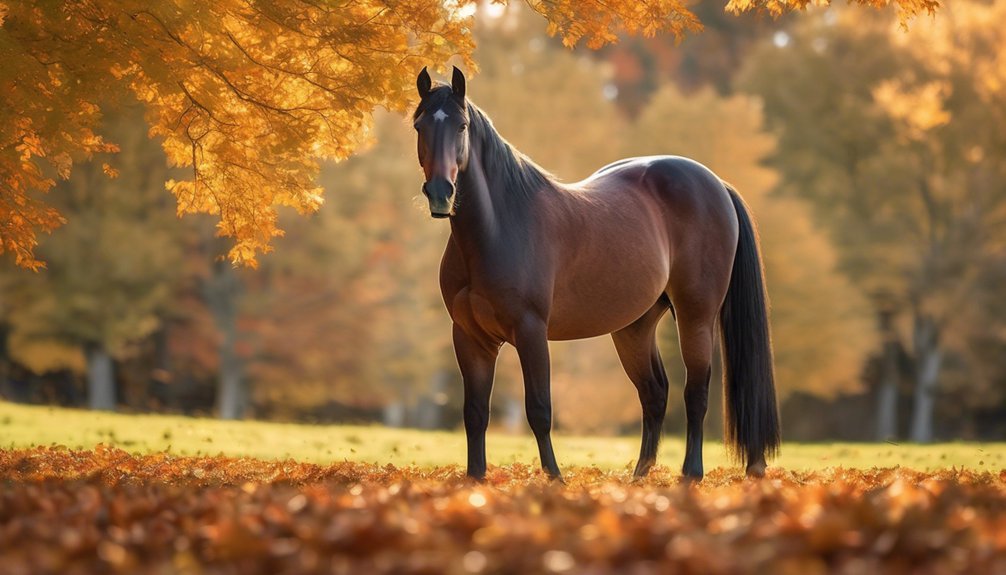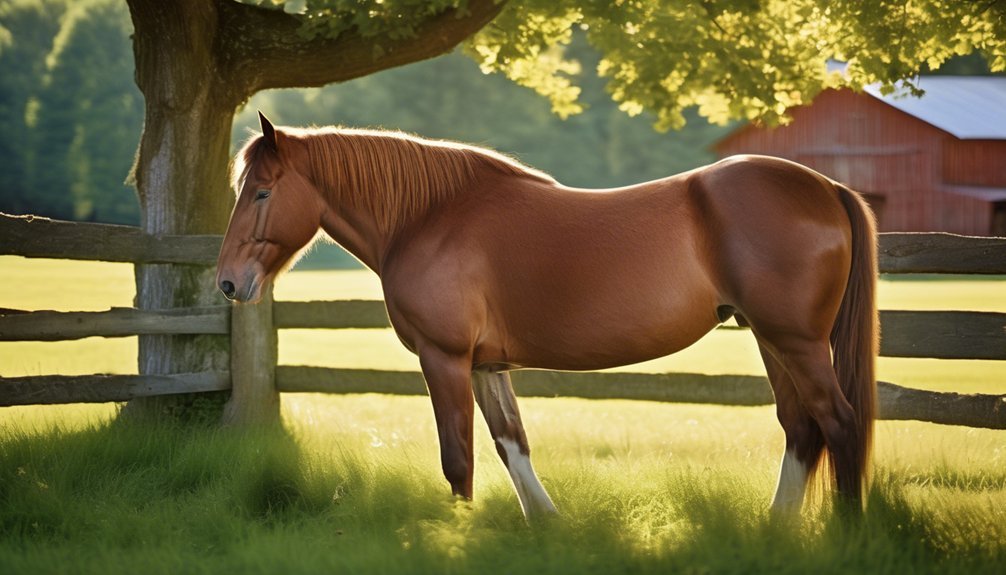
The environment affects your horse's coat condition in multiple ways, from temperature fluctuations to humidity levels. Understanding how these factors interact is crucial for maintaining a healthy, vibrant coat. Seasonal changes can alter coat texture and shine, while shelter and living conditions play a significant role in overall health. To keep your horse looking its best, consider how you can manage these environmental influences effectively. What steps will you take to enhance your horse's coat health?
Key Takeaways
- Temperature fluctuations can alter a horse's metabolism, impacting the quality and texture of their coat.
- High humidity levels may lead to excessive sweating, increasing the risk of skin issues and dull coat appearance.
- Low humidity can cause a brittle coat due to dryness, affecting overall coat health.
- Regular grooming helps distribute natural oils, enhancing coat shine and promoting skin health in varying environmental conditions.
- Providing adequate shelter from harsh weather protects horses, supporting a healthy and vibrant coat throughout seasonal changes.
Understanding Horse Coat Structure

Understanding the intricate structure of a horse's coat is essential for appreciating how environmental factors influence its condition. Each hair originates from a hair follicle, an anatomical structure that plays a crucial role in determining not just the coat's texture but also its overall health.
The anatomy of these follicles affects how well they can produce and maintain hair, which is vital for protection against the elements. Furthermore, coat color genetics dictate the pigmentation and pattern of your horse's coat, making it a reflection of its lineage.
The Role of Nutrition in Coat Health
The health and appearance of a horse's coat are significantly influenced by its diet. To ensure a vibrant coat, you need to focus on quality nutrient sources.
Essential fatty acids, proteins, and vitamins play crucial roles in maintaining coat condition. For instance, omega-3 and omega-6 fatty acids promote shine and elasticity, while adequate protein supports overall hair growth.
Be mindful of potential vitamin deficiencies, particularly vitamins A, E, and biotin, as these can lead to dullness and brittleness. Regularly assess your horse's feed to confirm it meets these nutritional requirements.
Influence of Seasonal Changes

As temperatures fluctuate with the changing seasons, your horse's coat undergoes significant transformations that can affect its overall condition.
During fall, your horse prepares for winter by developing a thicker winter coat, which provides insulation against cold weather. This process is essential, as it helps regulate body temperature.
As spring approaches, you'll notice seasonal shedding, where your horse loses its winter coat in favor of a lighter, cooler coat for warmer months. This shedding can lead to temporary changes in coat texture and shine.
To support this natural process, ensure your horse receives proper nutrition and grooming. Regular brushing helps remove loose hair and promotes healthy skin, allowing for a smooth transition between seasonal coats.
Impact of Temperature and Humidity
While temperature and humidity significantly influence your horse's coat condition, their effects can vary based on individual factors like breed and overall health.
Temperature fluctuations can affect your horse's metabolic processes, impacting fur growth and quality. In warmer months, increased humidity levels may lead to excessive sweating, which can cause coat dullness and skin issues if not properly managed.
Conversely, lower humidity can lead to dryness, resulting in a brittle coat. You should monitor these environmental factors closely and adjust grooming routines accordingly.
Regular brushing helps distribute natural oils, enhancing coat shine and health. By understanding how temperature and humidity interact with your horse's unique needs, you can better support their overall well-being and coat condition.
The Importance of Shelter and Living Conditions

Proper shelter and living conditions are crucial for maintaining your horse's coat health, especially when faced with varying weather conditions.
A well-chosen shelter type and adequate living space can make all the difference in your horse's overall well-being. Here are some key aspects to consider:
- Protection from Elements: Ensure your horse is shielded from rain, wind, and extreme temperatures.
- Ventilation: Proper airflow in the shelter prevents moisture buildup and reduces respiratory issues.
- Cleanliness: Regularly clean the living space to minimize pests and prevent skin irritations.
- Comfortable Bedding: Provide soft, dry bedding that supports your horse's body and keeps them warm.
Grooming Techniques for Optimal Coat Care
Maintaining your horse's coat health goes beyond adequate shelter and living conditions; grooming plays a vital role in achieving optimal coat care.
Use quality grooming tools tailored for your horse's coat type. Employ effective brushing techniques, such as curry combs followed by soft brushes, to stimulate skin care and enhance oil application.
Adjust your bathing frequency based on climate and activity; over-bathing can strip essential oils. Incorporate coat supplements for added nourishment.
Seasonal grooming is crucial—focus on detangling methods during shedding periods to manage hair loss effectively.
Regular coat brushing not only keeps the coat shiny but also promotes bonding. By prioritizing these practices, you'll ensure your horse's coat remains healthy, vibrant, and well-maintained throughout the year.
Common Coat Issues Related to Environment

Environmental factors can significantly impact your horse's coat condition, leading to various common issues that require attention. Understanding these problems can help you maintain a healthy coat. Here are some issues to consider:
- Coat Discoloration Causes: Sun exposure can bleach the coat, causing uneven color tones.
- Skin Irritation: Environmental allergens like pollen and dust can lead to itching and inflammation, affecting coat quality.
- Dullness: Pollution and poor air quality can strip natural oils, resulting in a lackluster appearance.
- Fungal Infections: Humidity can promote fungal growth, leading to patches and loss of hair.
Hydration and Its Effect on Coat Condition
While you mightn't realize it, hydration plays a crucial role in determining your horse's coat condition. Adequate hydration is essential for maintaining a healthy hydration balance, which directly influences skin health and coat shine.
Water is the primary hydration source, but consider adding electrolytes or wet feeds to enhance moisture intake. When your horse is well-hydrated, their skin remains supple, preventing dryness and flakiness that can lead to a dull coat.
Conversely, dehydration can result in a lackluster appearance, and skin problems may arise. Regularly monitor your horse's water intake, especially during hotter months or after intense exercise, to ensure they're receiving enough hydration.
A hydrated horse isn't just healthier but also boasts a vibrant, glowing coat.
Preventative Measures for Maintaining Coat Health

To ensure your horse's coat remains healthy and vibrant, implementing preventative measures is essential.
By focusing on specific practices, you can mitigate the effects of environmental factors that may compromise coat condition.
Here are four key strategies for effective coat care:
- Regular Grooming: Engage in preventative grooming to remove dirt and debris, stimulating skin health.
- Balanced Diet: Provide high-quality feed rich in essential fatty acids and vitamins to enhance coat luster.
- Adequate Shelter: Protect your horse from harsh weather conditions to minimize stress on their coat.
- Routine Health Checks: Schedule regular veterinary visits to address any underlying issues that could affect coat quality.
These measures will help maintain your horse's coat in optimal condition, fostering a strong bond between you.
Frequently Asked Questions
How Does Stress Affect a Horse's Coat Condition?
Stress can lead to elevated stress hormones in your horse, causing increased coat shedding. This disruption in normal shedding patterns may result in a dull or unhealthy appearance, affecting your horse's overall coat condition significantly.
Can Parasites Influence Coat Health?
When you observe a horse's dull, lifeless coat, remember that parasites can sap vitality. Effective parasite control and regular coat grooming not only enhance appearance but also promote overall health, ensuring your horse shines brightly.
What Role Does Genetics Play in Coat Quality?
Genetic inheritance significantly influences your horse's coat quality. Traits like coat color and texture are passed down through generations, affecting not just appearance but also overall health. Understanding this can help you select horses with desirable attributes.
How Often Should I Change My Horse's Bedding?
Imagine your horse resting on soft, clean bedding. You should change it at least once a week, but daily spot cleaning is essential for maintaining bedding materials and ensuring optimal bedding maintenance for your horse's comfort.
Are Certain Breeds More Prone to Coat Issues?
Yes, certain breeds are more prone to coat issues due to specific coat types and breed characteristics. Breeds with dense, long fur may struggle with moisture and parasites, affecting overall coat health. Regular grooming's essential.
Conclusion
So, while you're busy perfecting your horse's Instagram filter, remember that their coat isn't just a fashion statement. It's a delicate interplay of environment, nutrition, and care. If you ignore temperature, humidity, and grooming, you might end up with a horse that resembles a scruffy mop more than a majestic steed. Embrace the science of coat care, and your horse will shine brighter than any filtered photo—because let's face it, no one wants a horse that looks like it just rolled in the hay… oh wait!





